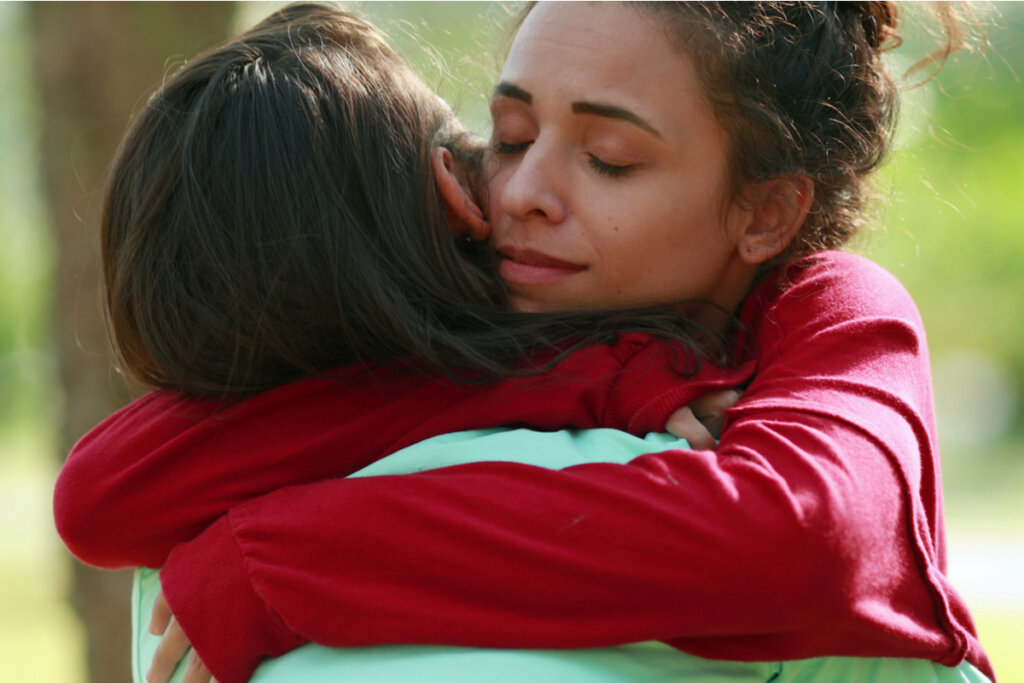Five Keys to Forgiveness


Reviewed and approved by the psychologist Sergio De Dios González
From a young age, values such as forgiveness have no doubt been instilled into you. Furthermore, knowing how to forgive helps you regain your emotional balance. It doesn’t only concern a forgiving gesture toward the other person, but also toward yourself. Since it’s so important, we’d like to give you a few keys for learning to forgive.
Of course, it’s not advisable to live under the shadow of resentment and revenge. Everyone suffers grievances and even the worst and most painful deserve to end in forgiveness. Indeed, the saying “An eye for an eye, and we will all end up blind” couldn’t be truer.
Knowing how to forgive, in many cases, is nothing more than a question of attitude. Nevertheless, beyond your words of forgiveness, you must feel sincere. This opens the door to repairing the pain. In fact, among the many benefits of forgiveness is the peace it produces.
Learn to forgive
Although it may not seem like it, learning to forgive isn’t that simple. As we said, forgiveness must go hand in hand with sincerity. That’s why we want to give you a few keys that may be useful:
- Understanding. It’s clear that you can never forgive someone if you don’t really understand what motivated their actions. As much as the injury has hurt you, a minimum of empathy is essential to sincerely forgive someone.
- Humility. In order to empathize with someone who’s hurt you, you must let go of certain of your prejudices and feelings of superiority. It’s true that you’re the victim in all of this, but, without humility, it’ll be difficult for you to forgive.
- Generosity. When you forgive someone, you mustn’t expect anything in return. In fact, forgiveness is a great gesture of generosity. Never lose sight of that.
- Love. You may find it difficult to associate the idea of love with someone who’s hurt you. However, try to remember that those with the greatest capacity to harm you are those closest to you. For this reason, forgiveness usually goes hand in hand with love.
You should always keep in mind these concepts since they’re indivisible from a capacity such as forgiveness. Also, remember that a conciliatory attitude is essential to really approach someone who’s caused you pain.

Why forgiveness is good
There are many reasons why forgiveness is positive. One of them is that it allows you to look ahead and keep moving forward. Indeed, it’s difficult to progress if the obstacles that lie ahead are hatred and resentment.
In order to empathize with someone who’s hurt you, you must let go of certain prejudices and feelings of superiority.
Forgiveness helps maintain your self-esteem and let go of painful events in the past. Furthermore, forgiving reduces your fear of being cheated on and rejected. It also increases your self-confidence. Therefore, it’s extremely important to learn to forgive.
Also attributed to forgiveness is the ability to free yourself from events that rob you of your energy and affect your personal performance.
Five keys to forgiving someone
Now that you know how to reach a sincere and heartfelt forgiveness, we’ll give you a series of tips that’ll help you to forgive.
1. Get rid of resentment
If you’re resentful, it’ll be extremely difficult to forgive anyone. In addition, resentment doesn’t take long to give rise to a need for revenge. This will only cause you to distance yourself from the other person.
2. Remember the past
Forgiveness doesn’t mean wiping the slate clean but recognizing the damage caused and repairing it. Because you’ll never be completely at peace, no matter how much time has passed, if you can’t remember the event without feeling resentful.
3. Learn to listen
When you feel hurt, you tend to close yourself down and you don’t listen to what the other party has to say. However, if you don’t open the channels of communication, forgiveness will be impossible.
4. Believe in the other person
This also means having faith that the other person will recognize and learn from their mistakes. After all, forgiveness is just a second chance to learn from mistakes.
5. Recognize the harm
If you’re not able to recognize the damage they’ve caused you, it’ll be difficult to forgive them. In fact, it’s extremely common that, as a victim, you don’t fully recognize the pain you’ve felt. Nevertheless, it’s essential if you want to forgive the other person with all your heart.

The importance of forgiving yourself
Lastly, we want to talk about the need to forgive yourself. Because, at the end of the day, it’ll be useless if you develop that capacity outwards and not inwards.
Everyone makes mistakes. If you’re unable to forgive yourself, you’ll find it difficult to be at peace. This means that your interpersonal relationships will become rather complicated.
From a young age, values such as forgiveness have no doubt been instilled into you. Furthermore, knowing how to forgive helps you regain your emotional balance. It doesn’t only concern a forgiving gesture toward the other person, but also toward yourself. Since it’s so important, we’d like to give you a few keys for learning to forgive.
Of course, it’s not advisable to live under the shadow of resentment and revenge. Everyone suffers grievances and even the worst and most painful deserve to end in forgiveness. Indeed, the saying “An eye for an eye, and we will all end up blind” couldn’t be truer.
Knowing how to forgive, in many cases, is nothing more than a question of attitude. Nevertheless, beyond your words of forgiveness, you must feel sincere. This opens the door to repairing the pain. In fact, among the many benefits of forgiveness is the peace it produces.
Learn to forgive
Although it may not seem like it, learning to forgive isn’t that simple. As we said, forgiveness must go hand in hand with sincerity. That’s why we want to give you a few keys that may be useful:
- Understanding. It’s clear that you can never forgive someone if you don’t really understand what motivated their actions. As much as the injury has hurt you, a minimum of empathy is essential to sincerely forgive someone.
- Humility. In order to empathize with someone who’s hurt you, you must let go of certain of your prejudices and feelings of superiority. It’s true that you’re the victim in all of this, but, without humility, it’ll be difficult for you to forgive.
- Generosity. When you forgive someone, you mustn’t expect anything in return. In fact, forgiveness is a great gesture of generosity. Never lose sight of that.
- Love. You may find it difficult to associate the idea of love with someone who’s hurt you. However, try to remember that those with the greatest capacity to harm you are those closest to you. For this reason, forgiveness usually goes hand in hand with love.
You should always keep in mind these concepts since they’re indivisible from a capacity such as forgiveness. Also, remember that a conciliatory attitude is essential to really approach someone who’s caused you pain.

Why forgiveness is good
There are many reasons why forgiveness is positive. One of them is that it allows you to look ahead and keep moving forward. Indeed, it’s difficult to progress if the obstacles that lie ahead are hatred and resentment.
In order to empathize with someone who’s hurt you, you must let go of certain prejudices and feelings of superiority.
Forgiveness helps maintain your self-esteem and let go of painful events in the past. Furthermore, forgiving reduces your fear of being cheated on and rejected. It also increases your self-confidence. Therefore, it’s extremely important to learn to forgive.
Also attributed to forgiveness is the ability to free yourself from events that rob you of your energy and affect your personal performance.
Five keys to forgiving someone
Now that you know how to reach a sincere and heartfelt forgiveness, we’ll give you a series of tips that’ll help you to forgive.
1. Get rid of resentment
If you’re resentful, it’ll be extremely difficult to forgive anyone. In addition, resentment doesn’t take long to give rise to a need for revenge. This will only cause you to distance yourself from the other person.
2. Remember the past
Forgiveness doesn’t mean wiping the slate clean but recognizing the damage caused and repairing it. Because you’ll never be completely at peace, no matter how much time has passed, if you can’t remember the event without feeling resentful.
3. Learn to listen
When you feel hurt, you tend to close yourself down and you don’t listen to what the other party has to say. However, if you don’t open the channels of communication, forgiveness will be impossible.
4. Believe in the other person
This also means having faith that the other person will recognize and learn from their mistakes. After all, forgiveness is just a second chance to learn from mistakes.
5. Recognize the harm
If you’re not able to recognize the damage they’ve caused you, it’ll be difficult to forgive them. In fact, it’s extremely common that, as a victim, you don’t fully recognize the pain you’ve felt. Nevertheless, it’s essential if you want to forgive the other person with all your heart.

The importance of forgiving yourself
Lastly, we want to talk about the need to forgive yourself. Because, at the end of the day, it’ll be useless if you develop that capacity outwards and not inwards.
Everyone makes mistakes. If you’re unable to forgive yourself, you’ll find it difficult to be at peace. This means that your interpersonal relationships will become rather complicated.
All cited sources were thoroughly reviewed by our team to ensure their quality, reliability, currency, and validity. The bibliography of this article was considered reliable and of academic or scientific accuracy.
- Burggraf, J. (2003). Aprender a perdonar. In ponencia Congreso de la Familia, Universidad de La Sabana-Aspaen-Corpaf, Bogotá.
- Prieto-Ursúa, M., & Echegoyen, I. (2015). ¿Perdón a uno mismo, autoaceptación o restauración intrapersonal? Cuestiones abiertas en psicología del perdón. Papeles del psicólogo, 36(3), 230-237.
- Zalles, C., & Zavarce, P. (2004). Perdonar: una experiencia liberadora que lleva al bienestar. Las Fortalezas del Venezolano. Venezuela. Editorial Alfa. 1ª Edición. pp, 109-23.
This text is provided for informational purposes only and does not replace consultation with a professional. If in doubt, consult your specialist.







